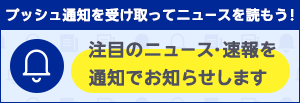ドーナツによって運命が激変したカンボジア難民の数奇な半生を追う。アリス・グー監督 『ドーナツキング』 インタビュー/Interview with Alice Gu about “The Donut King”
NeoL / 2021年11月8日 17時0分
ドーナツによって運命が激変したカンボジア難民の数奇な半生を追う。アリス・グー監督 『ドーナツキング』 インタビュー/Interview with Alice Gu about “The Donut King”
きっと誰もが大好きな甘くて美味しいドーナツによって、運命が激変した男の数奇な半生に迫るドキュメンタリー映画『ドーナツキング』が11月12日(金)より公開される。ドーナツ店の経営で約22億円もの資産を築き、全米の“ドーナツ王”と呼ばれた男の名はテッド・ノイ。1975年に祖国カンボジアの内戦から逃れ、難民として家族とカリフォルニア州に渡った人物だ。彼の始めたドーナツビジネスは脈々と受け継がれ、現在もカリフォルニア州のドーナツ屋の90パーセント以上はカンボジア系アメリカ人が経営しているのだという。映画は、無一文でアメリカ生活をスタートしたテッドの波乱万丈な人生を、カンボジア内戦や難民問題、さらには、知られざるアメリカのドーナツ事情まで、驚きのエピソードの数々を交えて描き出す。監督を務めたのは、リドリー・スコットがその才能を認めたアリス・グー。長編監督デビュー作である本作は、昨年のSXSW 映画祭で審査員特別賞に輝いた。撮影監督として活躍してきた彼女は、なぜ自らメガフォンを執ってドーナツ王の物語を伝えようと決めたのか。映画の日本公開を前に、ロサンゼルスに住む監督にリモートインタビューを行った。(→ in English)
――ポップなイラストとドーナツが散りばめられたピンク色のポスターからは想像できないくらい、非常に興味深いドキュメンタリーですね。この映画を作ることになったきっかけは?
アリス・グー監督「最初のインスピレーションは、偶然に起こった予想外の出来事でした。当時、ベビーシッターを雇ったばかりだったのですが、夫が高級なグルメドーナツを買ってきて彼女に勧めたんです。すると、『結構です。私はカンボジアのドーナツしか食べないので』と言われました。そして数日後、彼女は“カンボジアのドーナツ”を買ってきてくれたんです。確かに美味しかったのですが、それはアメリカによくあるグレーズドドーナツでした。でも彼女は、『カンボジア人が作ったんだから、カンボジアのドーナツなんです』と言い張って。『カンボジア人がアメリカのドーナツを作ったら、それはアメリカのドーナツだよね』と言ったら、『違う、そうじゃない』と。そこで私は彼女が間違っていることを証明すべく、“カンボジアのドーナツ”、“ロサンゼルス”と検索しました。すると、“ドーナツ王”ことテッド・ノイに関する記事がたくさん出てきたんです。すべての記事をクリックしたのですが、そこに書かれている内容は信じられないものでした。ロサンゼルスで生まれ育った私にとって、目と鼻の先で起こっていた出来事だというのに、まったく知らなかったんです。私はすぐに魅了されて、これは伝えるべき物語だと確信しました」
――映画の製作はどのようにスタートしたのですか? テッド・ノイはどうやって見つけたのですか?
アリス・グー監督「すべての記事を読んだ後、テッドが高齢でカンボジアに住んでいることがわかり、この広い世界で、どうやって探せばいいのだろうと途方に暮れました。でも、もし記事に書いてあることが真実で、彼が本当にたくさんのドーナツ店を始めた人物なのだとしたら、カンボジア系アメリカ人が経営するドーナツ店問い合わせれば、テッドにつながるはずだと考えたのです。私はカリフォルニア州サンタモニカに住んでいたので、近所で一番有名なDK’sドーナツというお店に電話してみました。訛りの強い英語を話す人が出てくると予想していたのですが、電話を取った人物は若々しくて明るい声で、まったく訛りがありません。番号を間違えたか、もしくはカンボジア系のお店ではないんだなと思いました。でも、とりあえず事情を話してみたら、『ラッキーですね、ここに電話して正解です。私がお手伝いします。テッドは私の大叔父なんです。Facebookはやっていますか?』と言われたんです」
――すごいですね。
アリス・グー監督「それは映画にも出演している“ドーナツプリンセス”でした。彼女はすぐに私たちをFacebookでつなげてくれて、翌日にはテッドと初めて話すことができました」
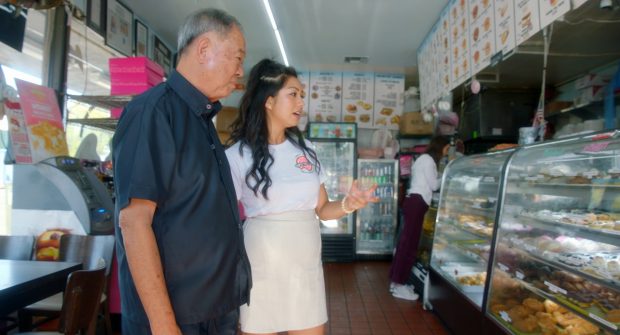
――ドキュメンタリーを作りたいと伝えたとき、テッドはどのような反応をしましたか?
アリス・グー監督「彼はとても驚いて、『本当に僕についての映画を作りたいのかい? 誰も僕のことなんて知らないのに』と言いました。私は、『本当にこの物語を伝えたいし、多くの人が聞きたがるはずです』と答えたんです。すると、なぜだかわからないのですが、『ハリウッドのアメリカ人ということは、白人かい?』と聞かれました。『中国系アメリカ人です』と答えると、『僕も中国系だよ! 中国系カンボジア人なんだ』と。そこで中国語で話しかけてみると、すぐに打ち解けることができました。少し中国語で話して、電話を切る頃には、『わかった、やろう。君のことが気に入ったよ。映画を作ろうじゃないか』と言ってくれたんです」
――この映画はテッドの半生やカンボジアの歴史、そしてアメリカの歴史など、いくつもの層で構成されています。制作する上で何が一番大変でしたか?
アリス・グー監督「一番苦労したのは、とても複雑な物語を混乱しないように伝えることです。あまり長すぎてもよくないので、私たちは90分程度で多くのことを語らなければなりませんでした。一家が共産主義や抑圧的な政権や大虐殺から逃れなければならなかったという事実や、アメリカで必死に働こうとしていた理由など、背景を十分に説明する必要があったんです。つまりは、歴史やテッドの物語、そして、現代の状況を織り交ぜて、すべてを納得のいく形で表現する必要がありました。これは人間のありようや精神についての非常に重要な物語ですが、そこには大量虐殺や200万人の死という重いテーマがあるわけです。カンボジアの人口の3分の1が亡くなったのですから、観ていてつらいですよね」
――そうですね。
アリス・グー監督「特にパンデミックに襲われたこの一年は、誰もが自宅でストレスを感じていたでしょうし、多くの人は現実逃避の手段として、あるいは憂鬱な気分にならないために、映画を観たいと思うのではないでしょうか。でも、私にはピンクでポップでみんなが大好きなドーナツがあったのでラッキーでした。それがわかった途端に、観客を旅に連れ出すことができたんです。ちょっと暗すぎたり重すぎたりしたら、いつでも話をドーナツに戻して楽しくすることができるのですから。映画を観た人たちからの反応も楽しいものでした。『全然想像できなかった! 最高だね。泣いちゃったよ。それからまた気分が上がって、アップダウンの繰り返しだった』と。テッドの人生と同じように、まるでアトラクションに乗っているような気分になるんです」
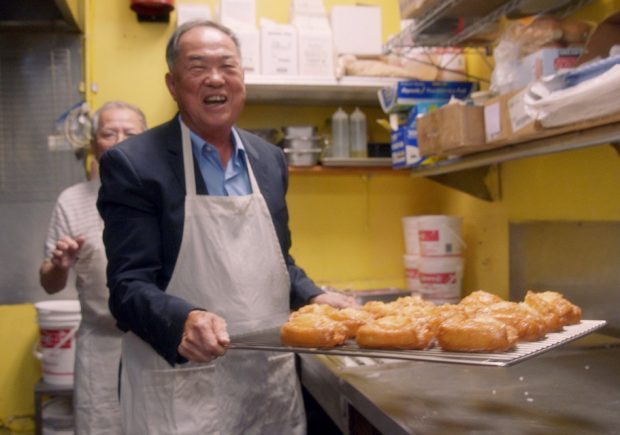

――テッドの半生を描く上でイラストが効果的に使用されていますが、なぜ実写にイラストを取り入れようと思ったのですか?
アリス・グー監督「残念ながら、テッドの個人的なアーカイブはほとんど残っていなかったので、かなり早い段階でイラストの必要性を感じました。ほんの数枚の貴重な写真しか残っていないんです。イラストを描いたのは、アンドリュー・ヘムというカンボジア系のアーティストで、彼の絵は信じられないほど素晴らしいんです。インスタグラムでダイレクトメッセージを送ってみたところ、『ぜひ描かせてください。僕はドーナツキッズなんです。美大に進学するまでは、ドーナツの仕事しか知りませんでした。両親のドーナツ店を手伝っていたんです』と返事があって、びっくりしました。彼は、『実は僕の家族も映画に出てくるテッドを知っているんです。だから、ぜひ描きたいです』と話してくれました」
――テッド自身よりも家族の方が、カメラの前で語るのがつらかったのではないかと思われますが、家族の視点から語られる物語も興味深かったです。
アリス・グー監督「(取材できて)本当によかったです。実はカリフォルニアに住んでいる家族の皆さんのために上映会を開いたのですが、彼らがこの作品を気に入ってくれたということが、私にとって何よりも意味のあることでした。私はこの家族の物語を、正直に偽りなく描きたかったんです。テッドの元妻のクリスティは、『本当に素晴らしい作品だったけど、観ていてとてもつらかった』と話していました。彼女は(カンボジアの内戦で)両親を失っているので、たくさんのつらいことを追体験して、非常に感情が揺さぶられたようです」
――映画を観たテッドの感想は?
アリス・グー監督「コロナ禍だったので一緒には過ごせなかったんです。彼には別で観ていただいて、観終わってから話しました。テッドはこの映画と家族の物語をとても誇りに思っています」
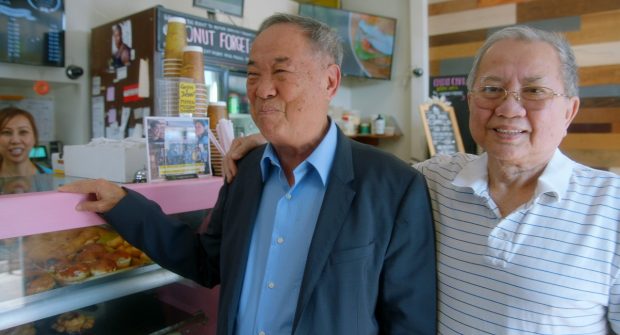
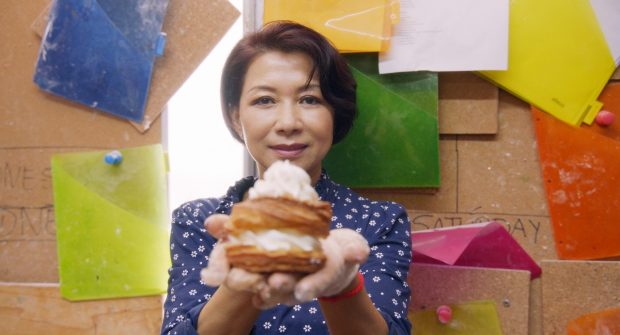
――難民問題は今も世界中に存在しますが、当時のカリフォルニア州知事がカンボジア難民の受け入れに難色を示したのに対し、フォード大統領が、『我々には移民を受け入れなければならない道徳的な義務がある』と語っていたことに驚きました。
アリス・グー監督「あのフォード大統領の発言は、本作で最も驚いた発見の一つでした。自分が生まれる前の出来事で、私の知らない歴史だったのです。共和党の大統領がそのように語っている姿を捉えた映像は、トランプ時代だった2017年、2018年の日常とは大きく違いました。それはまさに、私の両親(※中国からの移民)がたどり着いたアメリカだったんです。両親は、『みんなとても親切で、歓迎してくれて、手を差し伸べてくれた』と話していました。ところが今の世の中は、攻撃的で、これまで以上に社会が分断している、信じられないような状況です。まるで時代を逆行しているかのようですよね。私は人々がより良い人間になろうと思えたり、すぐに人をジャッジするのはやめようと思えるような、希望とインスピレーションのある物語を伝えたいと思いました。相手がどこから来て、どのような苦労をして、ここに至るまでにどんな生活をしてきたのか、わからないのですから。そして残念ながら、現在のアフガニスタンも同じような状況なんですよね。今はたくさんのアフガン難民が居場所を探しているわけですから。このことを頭の片隅に置いて、彼らにチャンスを与え、どのような事情があってここにたどり着いたのかを考えてみてほしいと思います」
――映画やテレビ番組におけるアジア人のレプリゼンテーションが十分とは言えない中で、アジア系移民の物語を知ることができたのもうれしかったです。
アリス・グー監督「この物語は私にとって驚きの発見でした。もちろん、アジア人の物語だからこそ気に入ったわけですが、私はレプリゼンテーションについてまでは考えが及んでいなかったんです。ただ素晴らしい作品ができたので、公開を楽しみにしていました。でも、昨年に映画を公開したら、特に若い世代のカンボジア系アメリカ人の方々が誇りに思ってくれたんです。長い間、カンボジア人について描かれるのは大虐殺や死ばかりでした。もちろん、それは彼らの物語の非常に重大な部分を占めています。でも、メールやSNSで感想を寄せてくれたすべての人が、『ハリウッド映画でカンボジア系のドーナツ店を目にする日が来るなんて思ってもみませんでした』、『今まで共感できる映画を観たことがなかったけど、これは完全に私の家族の物語です』とおっしゃるんです。タイ出身の女の子は、『ドーナツ店をタイラーメンのお店に置き換えたら、これは私の家族の物語になります』と話してくれました。そして、イギリスからも、『うちの家族はパキスタン出身で、私はイギリス人ですが、これは我が家の物語です』とメッセージが届きました。これは本当に普遍的な物語です。表面的にはアメリカの、そしてカンボジアの物語ですが、そこには普遍性があるのです」


――映画の冒頭には、ウータン・クランの「C.R.E.A.M.」がフィーチャーされています。どうやってあの曲の使用許可を得たのですか?
アリス・グー監督「このドキュメンタリーは私たちの愛と限られた予算で制作したので、あのような有名な曲に払える使用料はなかったのですが、エディターが編集の段階で仮に入れた曲が『C.R.E.A.M.』だったんです。私は聴いた途端に、他の曲はあり得ないほど完璧だと思いました。何よりも私はウータン・クランが大好きですし、この曲も大好きです。そして、ドーナツを意味する『C.R.E.A.M.』と、金稼ぎを意味する『C.R.E.A.M.』(※タイトルは“Cash rules everything around me”=“この辺では金がすべてを支配する”の頭文字)があって……この曲は本作のすべてを物語っているんです。そこで友人にお願いして、なんとかRZAにつないでもらいました。その一方で、映画『クレイジー・リッチ!』のジョン・チュウ監督が、劇中でコールドプレイの『Yellow』を使用するために、それがどれほど大切な曲なのかを熱く語った手紙を書いていたことを思い出したんです。私はそれを参考にして、『C.R.E.A.M.』は非常に重要な曲で、他に代わりはないのだと手紙を書きました。それでも許可は降りなかったので、再び手紙を書いて、改めて作品の重要性を説明し、収益の一部はRefugees International(※難民支援団体)に寄付すると伝えたんです。すると彼らは翌日に楽曲の使用を許可してくれました。“あなたの手紙に感銘を受けました。映画のメッセージにも共感します。喜んで楽曲の使用を許可させていただきます”と返事をくださったんです。あれは人生で最高の日でした! 信じられないですよね(笑)。奇跡でした」
――リドリー・スコット監督が製作総指揮として参加することになった経緯は?
アリス・グー監督「あれも人生で最高の日でした(笑)。私たちはロサンゼルスでコマーシャル制作にも従事しているのですが、プロデューサーのホセ(・I・ヌニェス)はRSAというリドリーのプロダクションで働いているんです。私たちは本作の撮影中に、『スコット・フリー(※リドリー・スコットが設立した映画製作会社)にプロデュースしてもらって、リドリー・スコットの名前をクレジットに入れられたら最高だよね』と夢見がちに話していました。ただの夢だったんです。でも、関係者経由でリドリーに観てもらったら、オフィスでずっと本作について話しているくらい気に入ってくれたそうです。電話がかかってきて、リドリーが自分の名前を入れたがっているので、プロデューサーのクレジットのスペースを一人分空けておくように言われました」
――もうすぐ日本公開されますが、この映画を観て、どのようなことを考えてほしいですか?
アリス・グー監督「まずひとつは、自分自身を信じるということ。自分を信用して、自分にはできるのだと信じてほしいです。テッドはまさに不可能なことをやり遂げたのですから。撮影中に彼が生まれた村を訪れたのですが、貧しい家族がたくさん暮らしていて、子どもたちは裸足でした。彼らを見ていたら、きっとテッドも同じように、十分な食べ物も靴を買うお金もなかったんだろうな、と思ったんです。そんな子どもだった彼がアメリカへ渡り、3年もしないで億万長者になったわけで、もし彼にできるのであれば、あなたにだって何でもできるはずです。そしてもうひとつは、相手がどのような状況からやって来たのかわからないのだから、人には親切にしよう、ということです。小さな優しさは大きな力になります」
――最後に、なぜドーナツは私たちを幸せな気分にしてくれるのだと思いますか?
アリス・グー「調べてみたのですが、世界中のほとんどの文化に甘い生地を揚げたお菓子があるんですよね。真ん中に穴が空いた丸いものであろうが、長いものであろうが、生地を揚げた甘いコンフォートフード(※ほっとする食べ物)があるんです。どの国にもそれぞれのバージョンがあって、だからこそ、世界的に愛される炭水化物なのだと思います。最近のドーナツに関して言うと、ピンクやトッピングやチョコレートが嫌いな人なんていないはず! 誰にとっても好きなドーナツがあるはずだし、ドーナツが好きじゃない人になんて会いたくないですよね。異なる文化で独自のフレーバーのドーナツが生み出されているのも興味深いです。無限の可能性を秘めているので、誰にでも気に入るドーナツがあるといいなと思います。
text nao machida
『ドーナツキング』
2021年11月12日(金)新宿武蔵野館他全国順次公開
http://donutking-japan.com
監督:アリス・グー 製作総指揮:リドリー・スコット
出演:テッド・ノイ、クリスティ、チェト・ノイ、サヴィ・ノイ、メイリー・タオほか
コピーライト:
© 2020- TDK Documentary, LLC. All Rights Reserved.
配給:ツイン
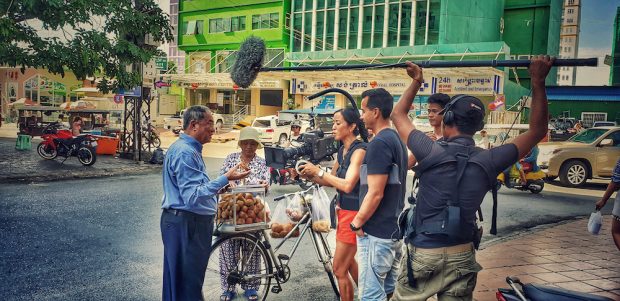
――When I first saw the poster with donuts and pink and pop illustrations, I didn’t know what I was going into, but this is such an incredible documentary. What inspired you to make it?
Alice Gu: The initial inspiration was very organic and unexpected. We had hired a new nanny at the time, and my husband had brought home these high-end gourmet donuts and offered them to her. But she said, “No, thank you. I only eat Cambodian donuts.” Long story short, a couple days passes and she brought us Cambodian donuts. It was delicious but we realized that it’s a glazed donut, you know, American donut. But she said, “No, no, this is Cambodian, because Cambodian people make it.” We said, “Well, if Cambodian people make an American donut, it's still an American donut,” and she says, “No, no, no, you're wrong.” I decided to put into Google up to prove her wrong. I put in “Cambodian donuts, Los Angeles” and all of these articles came up about Ted Ngoy, the Donut King. I clicked on every article and I couldn't believe what I was reading. It was something that I never knew. As somebody who was born and raised here in Los Angeles, this is a story right under my nose. I was instantly fascinated and knew straight away that this was a story that needed to be told.
――How did you start on the project? How did you find Ted Ngoy?
Alice Gu: After reading all these articles, I knew straight away that this is the story needed to be told, but I also gleaned that Ted was old and living in Cambodia. I said, “How am I going to find this guy in this big world?” But I thought if the articles were true that he started all the donut shops, I must be able to call any donut shop that is Cambodian and they must have a connection to Ted. I was living in Santa Monica, California and I called the local donut shop that is most well-known here, DK’s Donuts. I was expecting somebody with heavily accented English to pick up the phone, but the person who picked up the phone had a young, cheerful voice and no accent at all. I almost said I had the wrong number or thought this wasn't a Cambodian-owned shop. But I gave her the spiel anyway, and she says, “Well, you're in luck. You've called the right person. I can help you. Ted is my great uncle. Are you on Facebook?”
――Wow.
Alice Gu: It was the Donut Princess in the film. So she immediately connected us on Facebook, and the next day, we were on our first Facebook audio call.

――When you talk to Ted for the first time, what did he think about you making a documentary about him?
Alice Gu: He was very surprised and said, “Are you sure you want to make a movie about me? I'm not famous. Nobody knows who I am.” I said, “I am sure that I want to tell the story and people will want to hear the story.” And I don't know why he asked, but he said, “So you are American calling from Hollywood. Are you white?” I said, “Actually, I'm not. I'm Chinese American.” He said, “I'm Chinese, too! I'm Chinese Cambodian.” So I talked to him in Mandarin and we instantly broke the ice. We started speaking in Mandarin a little bit and by the end of the phone call, he said, “Yes. Let's do it. I like you. Let's make a movie.”
――This film consists of many layers such as Ted’s history, Cambodian history and American history. What was most challenging making this documentary?
Alice Gu: The most challenging was that this story is so complex and I didn't want to make a mess. Because we only have 90 minutes, you don't want it to be too long, and have to tell so much story in such a short amount of time, and to give enough context of why the stakes were so high, because they had to flee communism, they had to flee this oppressive regime, they had to flee genocide, and why they were in the U.S. willing to work so hard. So it was really weaving the history, Ted’s story, plus modern day and weaving that all in a way that made sense. This was such an important story for me to tell about the human condition and the human spirit, but with very heavy subject matter, genocide and the loss of 2 million people. That's a third of the population of Cambodia died, and that's not an easy thing to see.
――Right.
Alice Gu: I think particularly in this past year, the pandemic year, everyone has been at home or maybe stressed out. I feel like a lot of people wants to see films as a means to escape or not have it be so depressing. But I was so lucky because I had donuts that are so pink and pop in there, and everybody loves them. As soon as I knew that, I could take the audience on a journey. If it gets too dark and too heavy, I can always bring it back up to donuts and make it fun again. It's been a fun response from people who have seen the film. They said, “Well, I had no idea but I loved it. I cried and then I was up again and down and up and down.” So it was really taking a ride just like Ted's life.


――Also, it was very effective how you mixed the illustration to depict Ted’s history. Why did you decide to add the illustration?
Alice Gu: I decided early on we needed the illustration because unfortunately, there was so little personal archive left. He is a Cambodian artist Andrew Hem and his paintings are unbelievable. I didn’t know him but I DMed him on Instagram, and he wrote back. He said, “I want to do it. I'm a donut kid. It's the only job I've ever known until I went to art school. I worked in my parents’ donut shops.” I couldn't believe it. He said, “My family actually knows Ted in the story, so I want to do it.”
――I assume maybe it was harder for Ted’s family to talk about their history in front of the camera, but it was great to get to hear their side of the story as well.
Alice Gu: It was really wonderful. I was actually able to do a screening with the family here in California. What meant the most to me was that they liked the film, because I wanted to have it be honest and authentic portrayal of their family story. For Christy, Ted's ex-wife, she said “It was really incredible. But you know, it's really hard to see.” Because she lost her parents and to really relive a lot of that, it was quite emotional for her.
――What did Ted think about the movie?
Alice Gu: We couldn't be together because of Covid, so he watched it separately and we spoke after. He feels very proud of the movie and part of the family story.


――This film is relevant as we still have refugee crisis around the world today. I was surprised to see how President Ford said that they had moral obligation to take immigrants, while the governor of California was against having Cambodian refugees resettled in the state.
Alice Gu: One of the most fascinating things that I discovered was President Ford. I didn't know this piece of history. This is before I was born. To find this archive, a republican president who was saying that, it was so different from life in 2017, 2018, during the Trump era. This was the America that my parents came to. They said, “Everyone was so nice and welcoming and here to help you.” Then now, I can't believe present day, there are attacks and is more divided than ever. It almost seems like we are going backwards. I really wanted to tell a tale of hope and inspiration that inspires you to be a better person or to think not to judge people immediately. You don't know where they came from, what kind of hardships they lived, what kind of life they lived before they got here. And this has been particularly resonant, unfortunately with what's happening in Afghanistan right now. Thousands and thousands of Afghan refugees are looking to be settled somewhere. I would hope we think about this a little bit, and maybe give them a chance and think about where they came from.
――Growing up, there never was enough Asian representation in movies or TV shows, so I was happy to learn a story about Asian immigrants.
Alice Gu: Again, the story was a surprise discovery for me. Of course, I like it because it’s Asian, but one thing I didn't think about to your point of was representation. I just thought this was a wonderful film and I was excited to put it out there. But in the last year that this film has been released, the amount of people who have reached out, and particularly Cambodian, of course, young Cambodian Americans or Cambodians here, they feel a sense of pride. For a long time, all that has been represented for Cambodians is genocide and deaths which of course is a very huge part of their story. But all of the people who have reached out by email or social media that said, “I never in my life thought that I would ever see Cambodian donut shops in a Hollywood movie,” “I've never seen a movie that I could relate to, this is totally my family.” There was a girl from Thailand, she said, “This is totally my family story, just substitute donut shop for a Thai noodle shop and this is my family story.” And then I've had people reached out from the UK and they said, “My family is from Pakistan and I'm British. But this is my family story.” So it really is universal. Even if it just on the surface seems American and particularly about Cambodian, there is universality in the story.


――As soon as I started watching it, I knew I love it, because you featured “C.R.E.A.M.” by Wu-Tang Clan! How did that happen?
Alice Gu: It's crazy. So this is a documentary we made really with love and a shoestring budget. We didn't have the money for a big song like “C.R.E.A.M.” And we were in editing I gave some direction to my editors about what I wanted for music, and Rommel, one of our editors, he put “C.R.E.A.M.” temporarily. As soon as I heard it, I was like, “There can be no other song! This is perfect!” It's the double entendre. First of all, I love Wu-Tang Clan. I love the song. “C.R.E.A.M.” for donuts, “C.R.E.A.M.” for money making… This song is everything! So I reached out to my friend who is actually Japanese and she just gave me a phone number and it led to RZA. And I remembered when “Crazy Rich Asians” came out, Jon Chu wanted a song by Coldplay called “Yellow,” so he wrote a passion letter to Coldplay about why the song was so important to him. So I modeled my letter after Jon Chu’s letter. I wrote a letter to RZA saying why this song was so important to me and why there could be no other song. And it looked like it still couldn't be cleared. Then I wrote another letter and said, “This is why this film is important. If you would be so kind and so generous to allow us to use this track for the meager funds that we have, a portion of our proceeds, we have a partner with Refugees International, we would like to donate to them.” And they cleared the song the next day. They wrote back and said, “Your letter really resonated with us. We love the message of the film. We are happy to let you use the song.” That was one of the best days of my life! Unbelievable [laughs.] It was a miracle.
――Also, you have Ridley Scott credited as the executive producer. How did he get on board?
Alice Gu: That was the other best day of my life [laughs.] We work in commercials here in Los Angeles, and my producer Jose had been working for Ridley’s and it's called RSA. As dreamers when we were making this film, we were like, “Wouldn't it be so cool if we could get Scott Free on and Ridley Scott could put his name on it?” You know, it was a dream. But when we had a cut of the film and showed it to Ridley through his VP, they said that was all he was talking about in the office and that he loved the film. I got the phone call that we need to leave an extra producer credit because Ridley wanted his name on there.”
――So now the Japanese audience is about to discover Ted’s story. What would you like them to reflect on when they leave the theater?
Alice Gu: I think the audience takeaway is a lot of things. One is to really believe in yourself. Trust yourself and believe that you can do it. So that's Ted, really doing the impossible. When we were filming, we went to the place of his birth, this tiny village. And there is still a lot of very poor families and kids there who don't have shoes. I was looking at one of the kids and thought Ted was like one of these kids with not enough food and no money for shoes. And this kid found his way to America and became a multimillionaire in less than three years. If this guy can do it, you can do anything. So that is one takeaway and the second takeaway is to be kind to people because you never know where they came from. Little kindness goes a long way.
――Lastly, why do you think donuts make us so happy?
Alice Gu: I looked into this, and it seems that almost every culture in the world has some version of fried sweet dough. Whether or not it's in a round shape with the hole in the middle or if it's long, there seems to be some sort of fried dough sweet comfort food. So every country almost seems to have their own version and I feel like that is why it's this universally loved carb. But I say for the modern-day donut, who can't like pink and sprinkles and chocolate! There is a donut for everybody and I don't know if I want to know the people who don't like donuts, right? What's also been interesting that I've found is every culture has adapted donuts and they have their own flavors of donuts. It's really the possibilities are endless, so I hope there's something for everybody.
text nao machida
関連記事のまとめはこちら
https://www.neol.jp/movie-2/
外部リンク
- ドーナツによって運命が激変したカンボジア難民の数奇な半生を追う。アリス・グー監督 『ドーナツキング』 インタビュー/Interview with Alice Gu about “The Donut King”
- 「キャラクターはすべて、移民としての私がそうであったかもしれない可能性を拡張させて描いています。自由と、自由になるのがいかに難しいかについての物語です」『皮膚を売った男』カウテール・ベン・ハニア監督インタビュー/Interview with Kaouther Ben Hania about ”The Man Who Sold His Skin”
- どのジャンルにも属さない田中泯のダンスを犬童一心監督が捉えた『名付けようのない踊り』
- 「社会全体で過去の真実に敬意を持って向き合い、亡霊を永遠に追い払うことができるような、よりポジティブな場所へと移行する必要がある」ジェラルド・ブッシュ監督&クリストファー・レンツ監督 『アンテベラム』 インタビュー/Interview with Gerard Bush and Christopher Renz about “Antebellum”
- 「病気を患っている人を愛することはできるけど、本人が自分の体を大事にするべきだし、君は君自身のことを大切にするべき」アレクサンダー・ロックウェル監督&ラナ・ロックウェル 『スウィート・シング』 インタビュー/Interview with Alexandre and Lana Rockwell about “Sweet Thing”
この記事に関連するニュース
-
「自分にとって何が大切なのかを知ることができた」Jamie xx “In Waves”インタビュー
NeoL / 2024年9月16日 17時0分
-
【動画】ドローンが吐き出す炎で標的を焼き尽くすウクライナ最新兵器の破壊力
ニューズウィーク日本版 / 2024年9月11日 16時22分
-
Message from Anna Umemiya: “I began treatment for breast cancer on July 31.”
OTONA SALONE / 2024年9月4日 16時30分
-
面接対策から日常会話まで、「日本語のオンラインプライベートレッスン」9月生・10月生の募集を開始!
PR TIMES / 2024年8月31日 10時40分
-
【ミスミ】機械部品調達のAIプラットフォーム「meviy」/ ハンドクレーン業界シェアNo.1のアイコクアルファがmeviyを採用
PR TIMES / 2024年8月30日 13時15分
ランキング
-
1中国、犬を偽装したパンダが「ワンワン!」吠えてバレる パンダ犬が裏ブームとなる闇事情
もぐもぐニュース / 2024年9月24日 10時28分
-
2和田アキ子の限界「アッコにおまかせ!」に終了説 強面キャラが本物の権力者として批判されるように
東洋経済オンライン / 2024年9月24日 12時0分
-
3「そうだったのか!」料理長が教える玉ねぎの剥き方が参考になる
おたくま経済新聞 / 2024年9月23日 18時0分
-
4広島に瀬戸内の自然×シャトレーゼの魅力感じるリゾートホテル誕生
モデルプレス / 2024年9月24日 7時32分
-
5「撤退するヤツも容赦なし!」“異形の戦車”主体のロシア軍部隊 ウ軍陣地に突撃するも返り討ちに
乗りものニュース / 2024年9月24日 11時42分
記事ミッション中・・・
記事にリアクションする
![]()
記事ミッション中・・・
記事にリアクションする

エラーが発生しました
ページを再読み込みして
ください






